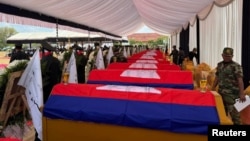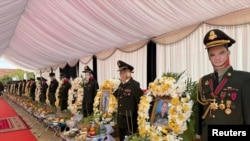ພິທີສົ່ງສະການໃຫ້ແກ່ທະຫານ 20 ຄົນໄດ້ຖືກຈັດຂຶ້ນ ໃນວັນອາທິດວານນີ້ ຜູ້ທີ່ໄດ້ເສຍຊີວິດ ຢູ່ທີ່ຄ້າຍທະຫານ ໃນພາກຕາເວັນຕົກສຽງໃຕ້ ຂອງກຳປູເຈຍ ໃນເຫດລະເບີດແຕກຂະໜາດໃຫຍ່ຂອງລູກປືນຕ່າງໆທີ່ເກັບສະສົມໄວ້ ທີ່ຍັງໄດ້ເຮັດໃຫ້ຜູ້ຄົນອື່ນບາດເຈັບ ແລະສ້າງຄວາມເສຍຫາຍແກ່ເຮືອນຫຼາຍຫຼັງທີ່ຢູ່ໃກ້ຄຽງ.
ບໍ່ມີການໃຫ້ຄຳອະທິບາຍໃດໆຢ່າງເປີດເຜີຍຂອງສິ່ງທີ່ເປັນສາເຫດທີ່ເຮັດໃຫ້ເກີດລະເບີດເມື່ອຕອນບ່າຍວັນເສົາທີ່ຜ່ານມາ ຢູ່ທີ່ຖານທັບໃນແຂວງ ຄຳປົ່ງ ສະປື ເຖິງແມ່ນ ຈະບໍ່ມີຂໍ້ສະເໜີໃດໆ ແຕ່ມັນກໍໄດ້ເກີດຂຶ້ນໂດຍເຈດຕະນາ.
ລັດຖະມົນຕີກະຊວງປ້ອງກັນປະເທດ ທ່ານທີ ເສຫາ ຕາງໜ້າໃຫ້ແກ່ນາຍົກລັດຖະມົນຮີ ຮຸນ ມາເນດ ໄດ້ເປັນປະທານໃນພິທີຊາປະນະກິດສົບ ເຊິ່ງເຂົ້າຮ່ວມໂດຍບັນດາຍາດຕິພີ່ນ້ອງຂອງພວກຜູ້ເຄາະຮ້າຍ ແລະ ເພື່ອນສະມາຊິກທະຫານຫຼາຍຄົນ. ທຸງຊາດຂອງກຳປູເຈຍ ໄດ້ປົກຄຸມໂລງສົບໄມ້ຂອງທະຫານດັ່ງກ່າວ.
ພວກຊາວບ້ານທີ່ອາໄສຢູ່ໃກ້ໆບ່ອນເກີດເຫດ ໄດ້ກ່າວຕໍ່ອົງການຂ່າວເອພີ ໃນວັນອາທິດວານນີ້ ວ່າ ໂຕຂອງລາວສັ່ນ ຫຼັງຈາກທີ່ໄດ້ຍິນສຽງລະເບີດ ເພາະວ່າ ລາວບໍ່ເຄີຍປະສົບກັບເຫດການນີ້ມາກ່ອນ ເຊັ່ນວ່າ ສຽງລະເບີດທີ່ດັງແຮງຫຼາຍ.
ທ້າວ ຈິມ ໂສທີ ເວົ້າວ່າ ເມື່ອລະເບີດໄດ້ເກີດຂຶ້ນ ຂ້ອຍກຳລັງແປງເຮືອນຂອງຂ້ອຍກັບພວກຄົນງານກໍ່ສ້າງຢູ່, ແລ້ວໃນທັນທີທັນໃດ ມີສຽງລະເບີດດັງແຮງ ເຮັດໃຫ້ເຮືອນຂອງຂ້ອຍສັ່ນສະເທືອນ ແລ້ວກະເບື້ອງຫຼັງຄາຂອງຂ້ອຍແຕກຫັກ. ພວກເຂົາເຈົ້າລົ້ມລົງ ແຕ່ໂຊກດີ ພວກເຂົາບໍ່ໄດ້ຕົກລົງມາພາຍໃນເຮືອນ.”
ພາບຕ່າງໆໄດ້ສະແດງໃຫ້ເຫັນຄວາມເສຍຫາຍຂອງຕຶກອາຄານຫຼາຍຫຼັງຢູ່ທີ່ຄ້າຍດັ່ງກ່າວ ຢ່າງໜ້ອຍຕຶກແຫ່ງນຶ່ງ ຫຼັງຄາປິວໄປໝົດ ແລະພວກທະຫານກໍໄດ້ຖືກສົ່ງໄປໂຮງໝໍເພື່ອການຮັກສາປິ່ນປົວ. ພາບອື່ນໆໄດ້ສະແດງໃຫ້ເຫັນຫຼັງຄາເຮືອນຫຼາຍຫຼັງທີ່ຢູ່ໃກ້ຄຽງ ມີຮູຫຼາຍບ່ອນ.
ຕຶກອາຄານສີ່ຫຼັງຢູ່ໃນຄ້າຍທະຫານ ເຊິ່ງສາມຫຼັງໃຊ້ເປັນສາງ ແລະອີກຫຼັງນຶ່ງເປັນຫ້ອງການເຮັດວຽກນັ້ນ ໄດ້ຖືກທຳລາຍ ແລະລົດຍົນທະຫານຈຳນວນນຶ່ງ ໄດ້ຮັບຄວາມເສຍຫາຍ, ອີງຕາມພັນເອກທະຫານບົກ ຢວງ ໂສກອນ ເຈົ້າໜ້າທີ່ທະຫານປະຈຳການຢູ່ແຫ່ງນີ້ ໄດ້ກ່າວຢູ່ໃນບົດລາຍງານຕໍ່ຜູ້ບັນຊາການທະຫານ ນາຍພົນເອກ ມາວ ໂສພັນ.
A funeral was held Sunday for 20 soldiers who died at an army base in southwestern Cambodia in a huge explosion of stored munitions that also wounded several others and damaged nearby houses.
There has been no public explanation of what caused the Saturday afternoon blast at the base in Kompong Speu province, though there were no suggestions it was triggered deliberately.
Defense Minister Tea Seiha, representing Prime Minister Hun Manet, presided over the Buddhist funeral ceremony, which was attended by relatives of the victims and fellow soldiers. Cambodian flags covered the wooden coffins.
A villager living nearby told The Associated Press on Sunday that he trembled after hearing the blast because he had never before experienced such a loud explosion.
“When the explosion happened, I was fixing my house with some construction workers,” said Chim Sothea. “Suddenly there was a loud explosion, causing my house to shake and breaking tiles on my roof. They fell down but luckily they didn’t fall inside the house.”
Images showed several badly damaged buildings on the base, at least one with its roof blown off, and soldiers receiving treatment in a hospital. Other photos showed nearby houses with holes in their roofs.
Four buildings on the base — three for storage and one work facility — were destroyed and several military vehicles damaged, Col. Youeng Sokhon, an army officer at the site, said in a report to army chief Gen. Mao Sophan.
Another villager, who asked to be named only as Sophal, said the military closed the road to the base and “villagers were in a panic, seeking a safe place.” He moved his family to his parent’s home, farther away from the base. When he returned to his own house hours later, he found it undamaged but other villagers’ houses had broken windows, doors and roofs, he said.
Cambodia, like many countries in the region, has been suffering from an extended heat wave, and the province where the blast took place registered a high of 39 C (102 F) Saturday. While high temperatures normally can’t detonate ammunition, they can degrade the stability of explosives over time, with the risk that a single small explosion can set off a fire and a chain reaction.
In March 2005, a nighttime blast at an arms depot in the northwestern provincial town of Battambang triggered an hour-long spray of shells and bullets, killing at least six people and causing panic.
A 2014 report by the Swiss-based group Small Arms Survey highlighted the dangers of poorly stored or mishandled munitions, calling it a “global problem.” It noted that from 1979 through 2013 there were more than 500 incidents involving unplanned explosions at munitions sites.






ຟໍຣັມສະແດງຄວາມຄິດເຫັນ